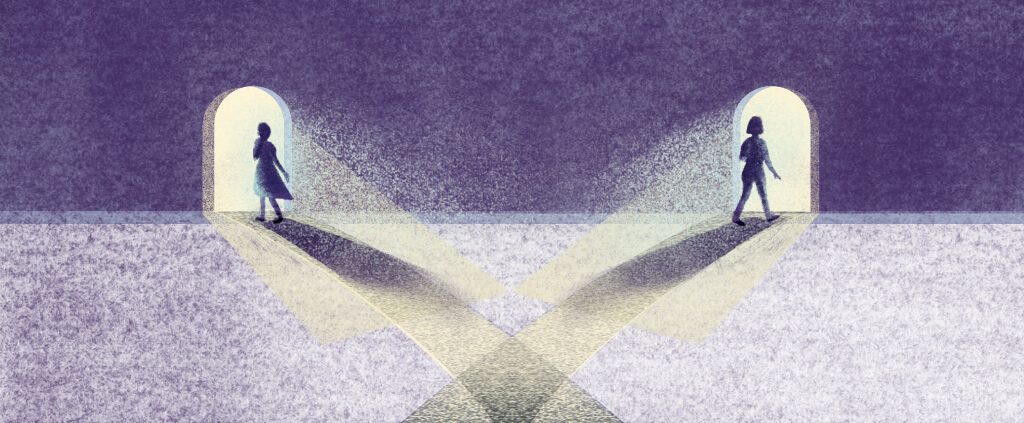t has been more than eight months since that night my friend and I had “the talk”.
In a romantic context, having “the talk” is an ominous sign. But in our case—as friends—I had hoped that it would conclude with tearful apologies and hugs. Unfortunately, it only led to more misunderstanding and terse accusations, followed by weeks of fearful avoidance.
My friend and I have known each other for 19 years. The one time I ran away from home, I went to stay with her. That was how close we were.
After years of living in different countries, in 2020 we finally found ourselves in the same place again. We were excited to see more of each other. Little did we know that being physically closer meant that the differences between us, which had gone unnoticed before, would become obvious and, sadly, widen the gap between us.
I’ve had my share of friendship “fades”—the kind of drifting apart that comes with growing up, moving away, getting married, having children.
But I’ve never had a friendship “breakup” that needed an immediate and intentional distancing. I say “breakup” because during our parting conversation, it was clear that we still cared about each other. But it was also clear that we couldn’t go back to the way things were.
Unlike romantic breakups, where well-adjusted people can go from being couples to being friends, with friendship, I’ve yet to learn what it looks like to “still be friends” but not like before.
As I nurse my wounds and grieve over the loss and lack of closure, I can’t help but think about what God might be teaching me. Of course, not all troubles come with “moral lessons”—life isn’t like Aesop’s Fables after all. But for us believers, suffering does usually prompt us to think about God and how He might be at work in us.
But for us believers, suffering does usually prompt us to think about God and how He might be at work in us.
And so, here are some realisations I’ve had about this experience:
1. We need to hold our relationships (friendships) loosely and hold onto God tightly.
I realised only very recently that what led to the unravelling of our friendship was a marked difference in our worldview, coupled with our insistence that we should understand and agree with each other.
My friend had hoped that her own experiences and successes could help guide me towards my own; but when she sensed that I wasn’t always keen to take her advice, she became disappointed in me. I, on the other hand, had hoped—expected—that she would empathise with my struggles, but became frustrated with her persistent attempts to “fix” me and my problems.
We know people change, but when it comes to our closest relationships, it can be difficult to accept these changes. We want our loved ones to “never change”, because if they do, that could jeopardise our relationship with them, and we’d lose the support we dearly depend on.
All this has taught me how profound it is to know that God is unchanging. Numbers 23:19 says, “God is not human, that He should lie, not a human being, that He should change his mind.”
For all the times I’ve complained about God being unreachable (i.e., not here in the flesh with me, not “human” enough), it is now a comfort to know that God is not human. He will not change His mind about me tomorrow, or ever. The love He has promised will keep.
| 5 Ways To Do Christ-centered FriendshipTitle: 5 Ways To Do Christ-Centered Friendship Artwork by: YMI X Barbs Jenjaroentham (@barbsiegraphy) Description: We are made for friendships. True friends are with us in the midst of our difficulties, intercede for us when we are too worn down to pray for ourselves, and gently point us in the correct direction when we end up straying […] |
2. Forgiving really hurts
Every time my hurts resurface, choosing to forgive—to not spiral and stew in the stench—can feel immensely painful. Sometimes, in a feeble attempt to cover my wound, I will latch onto anger—I will think about how my friend had willfully hurt me with her words, how she had said one thing and done another, how she had broken my trust.
But when the storm of hurt passes, I see God standing there, patiently waiting for me to listen to what He has to say. He then shows me again what His forgiveness looks like—that if it pains me so to forgive and love, how much more it pained Him when Jesus hung on the cross.
If it pains me so to forgive and love, how much more it pained Him when Jesus hung on the cross. How much more it hurts Him when we turn away from Him.
Yes, forgiving hurts, so we can only look to the One who hurt the most, and trust that His wounds will heal us, and stretch our capacity to love.
by Jane Lim
